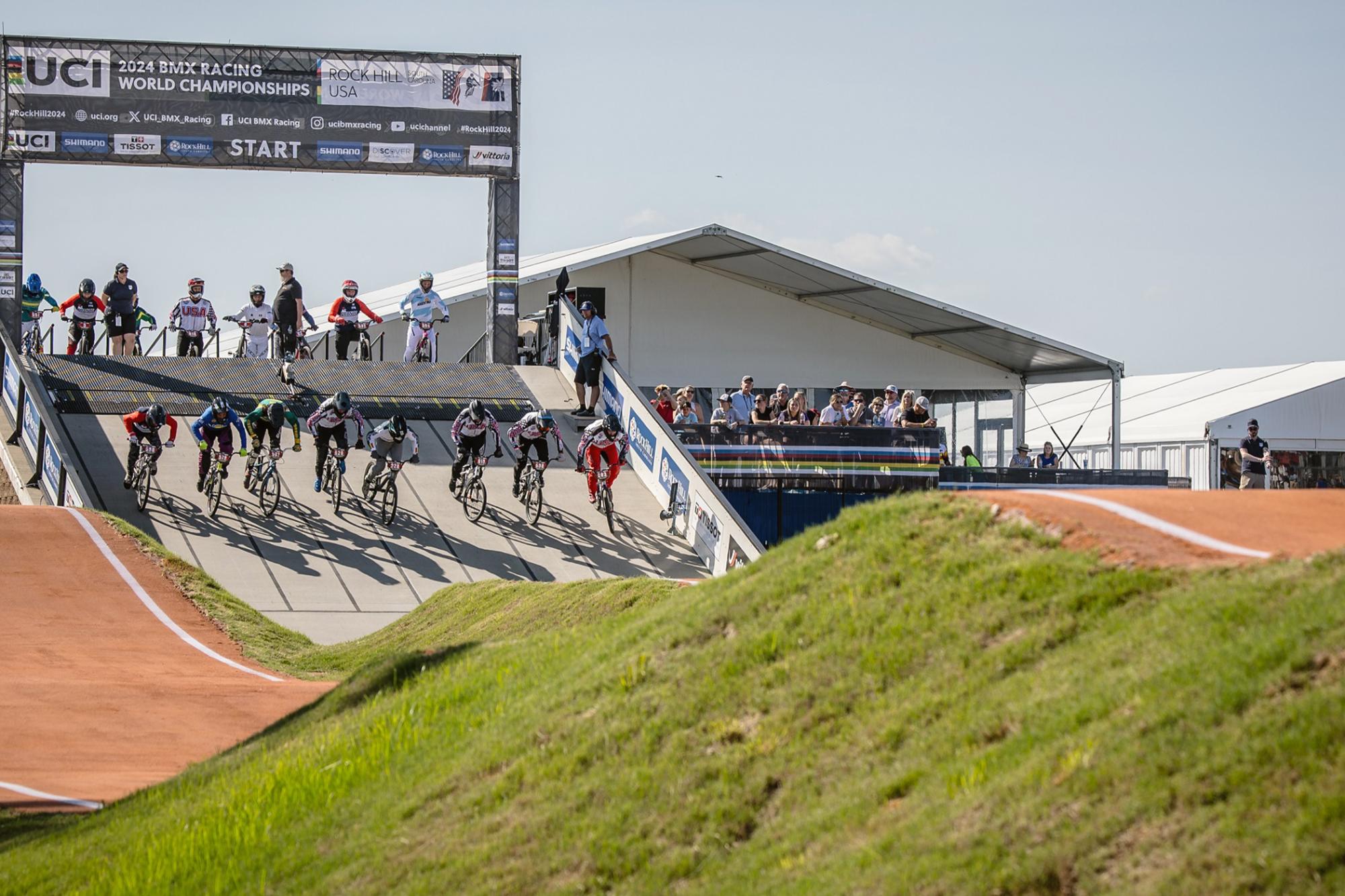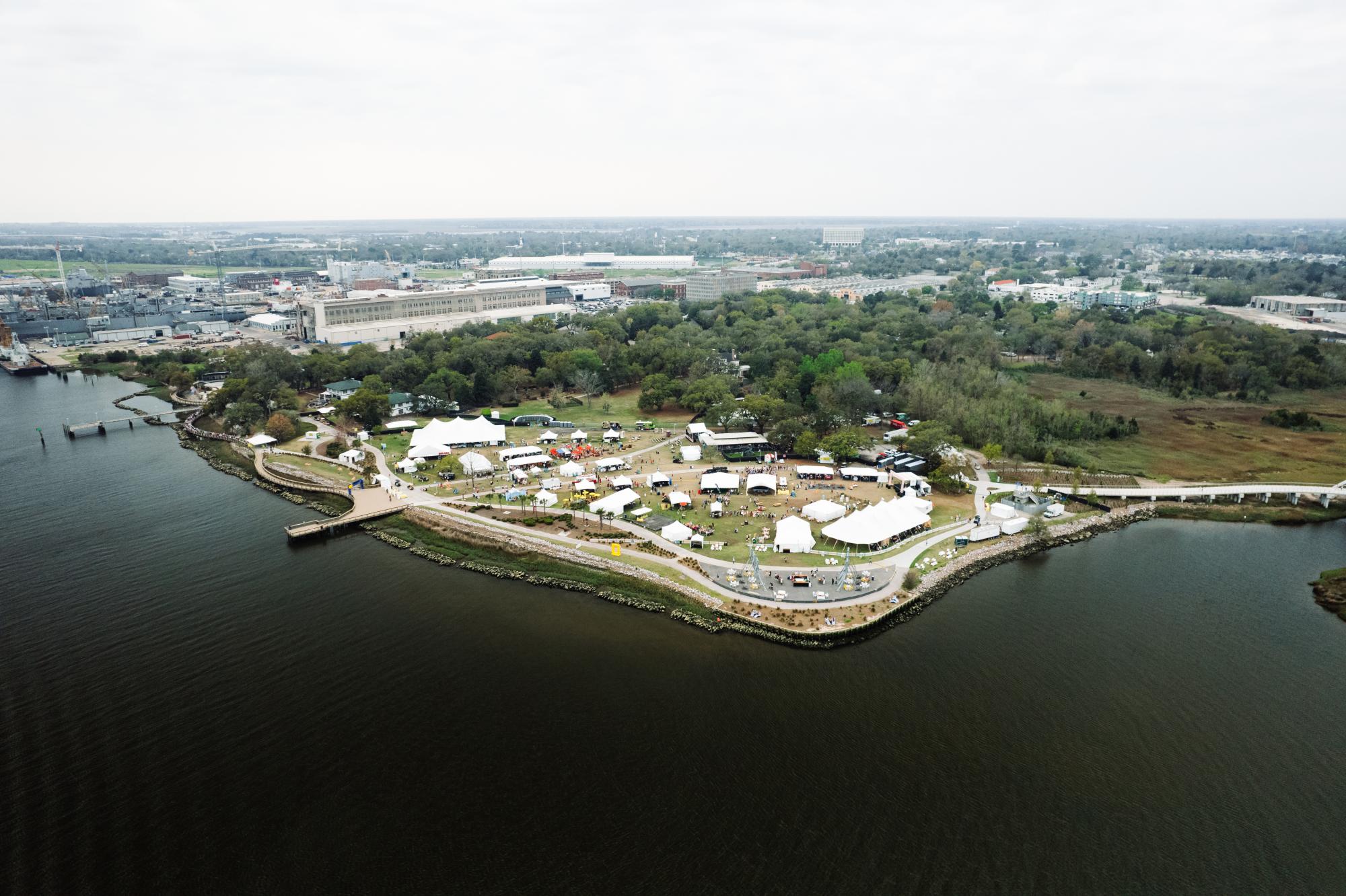
Rock Hill hosted the 2024 Union Cycliste Internationale BMX Racing World Championships.
Photo: City of Rock Hill.
Tourism is South Carolina’s largest industry, with an estimated annual economic impact of just under $30 billion. The SC Department of Parks, Recreation & Tourism estimates there are about 200,000 jobs tied to the hospitality industry. Those numbers cover everything from the nearly 200-mile-long coast with its sandy beaches to the Blue Ridge Mountains, with amusement parks, hotels, conferences and seasonal festivals in between.
For cities and towns in the state — places like North Charleston, Rock Hill or North Augusta — managing and marketing individual tourism assets can be a full-time job, or even several full-time jobs.
The City of North Charleston takes a multifaceted approach to marketing itself to visitors. First, it is a stone’s throw from one of the best-known tourist destinations on the East Coast — Charleston. It is home to an international airport, a U.S. Air Force base and the region’s largest arena and convention space, the North Charleston Coliseum & Performing Arts Center. Also, the city has spent the past decade repurposing the former naval shipyard into a major tourist attraction and event venue.
Each one of those points requires a slightly different approach.
North Charleston cooperates with Charleston and other surrounding towns in marketing the region under the “Explore Charleston” umbrella.
“We do some of our own promoting, but we do depend on Explore Charleston to be our destination marketing arm,” said Amy Heath, North Charleston’s director of tourism.
The city uses a management company to handle marketing and bookings for its coliseum and convention center, as well as a city-owned golf course, Westcott Golf Plantation. That leaves the former naval base and shipyard, now known as Riverfront Park, as Heath’s primary responsibility.

North Charleston’s Riverfront Park is home to the Culinary Village during the
Charleston Wine + Food Festival. Photo: City of North Charleston.
“Part of my role as director of tourism is running and overseeing all of the operations at Riverfront Park, and that includes concerts, festivals, events, weddings — you name it,” she said. “We have seven different venues out here that we operate. So my role kind of moved from more of a marketing-promotion focus to very much event-focused … Still, my role essentially in whatever I'm doing, whether it's the marketing side or running the Riverfront Park and its venues, is to bring tourists to our city.”
One big push for the city is to help those coming for events, such as weddings, find other things to do in North Charleston.
“We are working on our first visitor guide, but we're going to call it a cultural guide,” Heath said. “It talks about the uniqueness of the city, our assets, our food and beverage scene — things are important to people.”
The City of Rock Hill understands what it’s like to live next door to a major tourism draw with both Charlotte, N.C., and the Carowinds amusement park just up the road.
Even so, Rock Hill has a few surprises of its own for visitors, including a BMX Supercross Track, which hosted the 2024 UCI BMX Racing World Championships in May. That event alone had an estimated $30 million economic impact on the city, said Mark Sexton, the city’s new director of parks, recreation and tourism.
Although Sexton is new to the director’s role, he has worked for the city since the 1990s, when he was still a student at Winthrop University. He has held nearly every position available in the department.
“I don't think it hurts to be able to explain to the staff that there's really not anything that I'm going to ask you to do that I haven't already done myself,” he said.
Sexton understands how Rock Hill has developed its niche as a sporting event tourism destination. In addition to the BMX events, the city also hosts several basketball events, where high school players from around the country as well as some international players come to learn and be seen by college recruiters. The venue for that is the Rock Hill Sports and Event Center, which is being expanded from its current 170,000 square feet to accommodate more and larger events.
The city also has a velodrome, which is a track cycling arena, and a tennis center, both of which boast an international draw.
“We're building these facilities specifically to drive the economy through sports tourism,” Sexton said. “However, the beauty about this is that while these facilities are used for entertaining our guests — our tourists — our locals get to use these facilities when they're not used for these events at a very nominal cost.”
That has helped create opportunities for home-grown athletes who hope to showcase their talents on a larger stage. And, in the case of the American Cornhole League, that organization’s leaders enjoyed their time in Rock Hill so much, they relocated the league’s headquarters to the city.
“The tournaments are important, the events are important, but it's also people who are moving here because of these facilities and deciding to relocate and call Rock Hill their home,” Sexton said.
Like Rock Hill, the City of North Augusta also wants its new focus on tourism to benefit residents.

The Jack-O-Lantern Jubilee takes place on Georgia Avenue in North Augusta.
Photo: City of North Augusta.
“For tourism to do what we needed, we needed that to be a standalone department,” North Augusta Mayor Briton Williams said.
Earlier this year, the city named 20-year parks and recreation veteran Karl Waldhauer as the first director of the standalone tourism department. Waldhauer hired a marketing director, Jennifer Goldman, and the two set about helping North Augusta carve out a niche from neighbor of Augusta just across the Georgia state line.
“What Karl has done is nothing less than incredible,” Williams said.
First was a change in mindset. Instead of inviting people to visit North Augusta, the new tourism push encouraged them to “Explore North Augusta.”
“It is the key to everything,” Williams said. “It makes people want to get out and see what they can find.”
The city isn’t expecting to draw visitors from far away. Rather, it is hoping to get local and regional residents to get out and enjoy what it has to offer: namely, a riverfront with a performance venue as well as natural areas and a bustling downtown.
To find out exactly who is coming — and what they are doing when they get to North Augusta — the city has contracted with Placer.ai, which collects data from cell phones when people come for events.
“It tells us where people came from, how long they stayed at the event or location … and where they went afterward,” Waldhauer said. “We want to see that they went to downtown North Augusta and went to these businesses there.”
While learning where visitors come from can help the city better pinpoint its advertising, Waldhauer wants to stay focused on regional visitors and even the “tourists” who call North Augusta home.
“The city has had pretty amazing growth. We are going to continue to grow, but we want to keep that small-town feel,” Waldhauer said. “We have these assets we own that are used for these big events, but how can we use those on a daily and weekly basis so residents can actually enjoy this town?”
